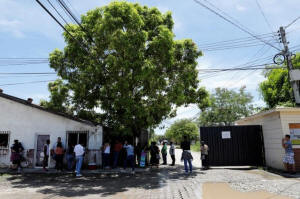|
U.S. State Dept. warned against ending
temporary protection for immigrants
 Send a link to a friend
Send a link to a friend
 [July 26, 2018]
By Daphne Psaledakis [July 26, 2018]
By Daphne Psaledakis
(Reuters) - The U.S. State Department
warned last October that a Trump administration decision to end
temporary protection for immigrants from El Salvador, Honduras and
Nicaragua could worsen efforts to combat illicit drug trade and gang
violence, according to documents released on Wednesday.
Senator Robert Menendez, the senior Democrat on the Senate Foreign
Relations Committee, made public the documents, which also warned that
the move could force U.S.-citizen children to return to those countries
with their parents, exposing them to rampant violence.
Then-Secretary of State Rex Tillerson wrote in a letter on Oct. 31, 2017
that the Central American countries no longer qualified to be designated
for Temporary Protected Status because of improved conditions following
environmental disasters that initially triggered the protective status.
But he also wrote that countries losing TPS status would likely
retaliate against the United States by reducing their help in countering
illegal immigration and gang violence.
The letter was sent to then-Acting Secretary of Homeland Security Elaine
Duke.

"Former Secretary Tillerson made it clear that ending TPS for El
Salvador and Honduras would have major repercussions, including a likely
backlash that weakened our cooperation to combat the drug trade and
criminal gangs in Central America. And yet, the Trump administration did
it anyway," Menendez said in a statement.
TPS offers protection from deportation to immigrants who already are in
the United States, including those who entered illegally, from countries
affected by natural disasters, civil conflicts and other problems.
When Trump took office, TPS was protecting about 300,000 people. It
covered El Salvador, Haiti, Honduras, Nepal, Nicaragua, Somalia, South
Sudan, Syria and Yemen.
But Trump has been skeptical about the program and has announced he was
ending TPS for immigrants from El Salvador, Haiti, Honduras, Nicaragua
and Sudan.
[to top of second column]
|

Families of the Honduras deportees from the U.S., under the Trump
administration's hardline immigration policy, wait for they
relatives outside the Migrant Center San Pedro Sula, Honduras June
22, 2018. REUTERS/Carlos Jasso

In May, the Trump administration announced that citizens of Honduras
would lose their TPS on Jan. 5, 2020. Over 55,000 Hondurans will
potentially be vulnerable to deportation.
At the time of the announcement, Marlon Tabora, Honduras' ambassador
to the United States, told Reuters the country lacks conditions for
the repatriation of tens of thousands of people.
In January, the Trump administration said it was ending TPS for El
Salvador on Sept. 9, 2019, giving around 200,000 Salvadorans 18
months to leave the United States or seek lawful residency.
"The fact that the Trump administration is knowingly putting our
national security and the safety of TPS beneficiaries and
U.S.-citizen children at risk is appalling and unacceptable,"
Menendez said in a statement. He called on Secretary of State Mike
Pompeo and Homeland Security Secretary Kirstjen Nielsen to reverse
the decision.
(Reporting by Daphne Psaledakis and Richard Cowan; Editing by Susan
Thoams)
[© 2018 Thomson Reuters. All rights
reserved.]
Copyright 2018 Reuters. All rights reserved. This material may not be published,
broadcast, rewritten or redistributed.
Thompson Reuters is solely responsible for this content.
 |